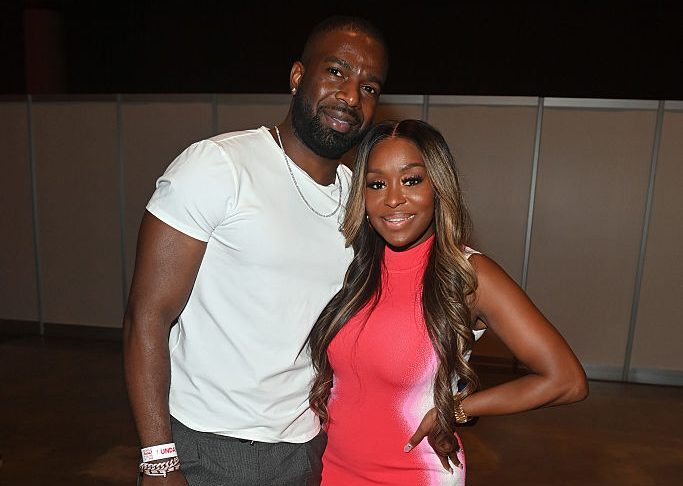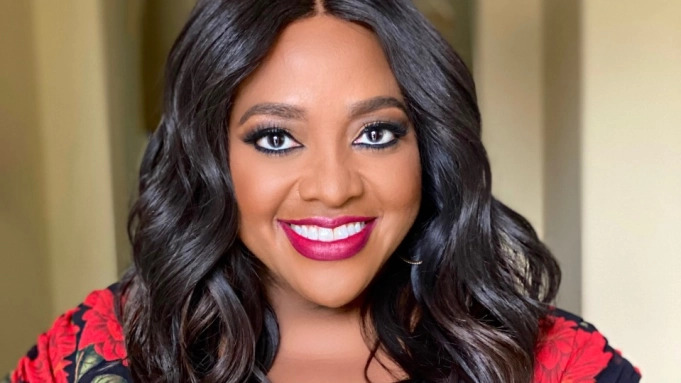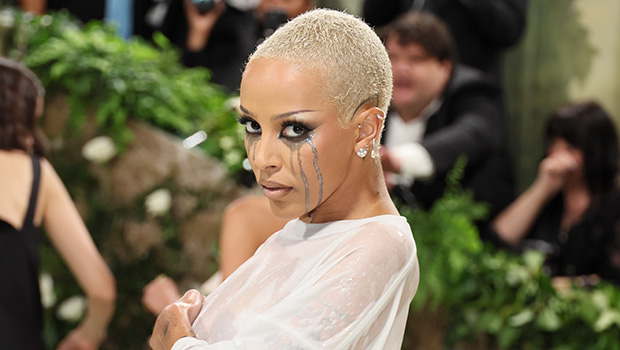Gina Brillon is a Puerto Rican actress, stand-up comedian, writer, and mom born and raised in the Bronx. In 2012, she became the first and only Latina winner of NBC’s Stand Up for Diversity Showcase. She went on to release comedy specials on NuvoTV, HBO, and Amazon Prime. She has appeared on “The View,” “Late Night With Seth Meyers,” and “Jimmy Kimmel Live,” and was the first Latina comedian to be a finalist in season 16 of “America’s Got Talent.”
For Mental Health Awareness Month, we asked Latine comedians and creators we admire how comedy has supported them in overcoming trauma and confronting life’s most significant challenges. Read the pieces here.
We don’t talk enough about the healing powers of humor. The old saying, “laughter is the best medicine,” as cliché as it may be, actually has a lot of truth to it. I learned about the power of laughter at a relatively young age. In Latino families, we often use humor to heal from traumas and hardships. It helps us get through so much. At home, we made jokes about everything from the government, cheese we ate, to the broke, kid games we played. I greatly touched on this in my Amazon Prime special, “The Floor is Lava.”
Mental Health Is Complicated For APIA Folks. Let’s Talk About It.
My childhood was good but came with its fair share of struggles. Money troubles were real, and I remember us being on food stamps at one point. We had our challenging times, but we somehow always managed to find opportunities to laugh about it. It was one of those, “if you don’t laugh, you’ll cry” type situations. But it wasn’t until I lost my grandmother that I realized the momentary relief a good laugh can bring, even in the face of loss and grief.
I say this all the time, but my grandmother is the entire reason why I decided to pursue a career as a stand-up comedian. I was probably around the age of 8 or 9 when I realized I had a gift for making people laugh. It was also around that age that it really hit me how healing laughter could be. Once I realized I could make someone laugh, it became a mission to make those around me laugh because I loved the joy I got out of it. My grandmother was the first grown-up in the family who noticed I was funny. She would tell my mom things like, “Your daughter is talented. She’s going to be on TV one day,” and I slowly started to believe her.
For a while, I kept the jokes for the family. I was this crazy, funny kid at home, but I was much more reserved whenever I was in public. As a kid, I was self-conscious because I was the chubby, funny girl. So, if I didn’t know you like that, I wouldn’t attempt to make you laugh because I was already too insecure. In fact, peers and schoolmates who knew me growing up were surprised when I became a stand-up comedian. They always thought I was funny, but they also thought I was shy because I was growing up. I was never the class clown. But I was the kid who was always quick with a joke. If I saw a joke somewhere, I would say it quickly before anyone else could say it first.
My grandma was probably one of the toughest women I’ve ever met — to this day. This was my grandma on my maternal side. She lived with us and passed away when I was 16, but a large chunk of my childhood was spent around this woman whom I absolutely adored. She came to New York from Puerto Rico and never really learned English like that, but the English she managed to learn was from watching “I Love Lucy.” That’s when I started understanding how much my grandma appreciated comedic relief. Once I learned that, I made it a point always to crack her up.
My grandmother wasn’t an easy woman to make laugh. She was tough, and she was serious. She also hated pranks. But she loved silliness. Something about silliness allowed her to soften and fully bring down her guard — regardless of what she was going through at the time. I started to study her sense of humor and provided her with the silliness I knew she enjoyed. When my grandmother laughed, she laughed with her entire being. She exuded absolute joy — it brought out another side of her that I appreciated at a young age. That became our biggest way of connecting — making her laugh.
But when I was around 11, my grandmother’s health began to decline. She would get cuts and bruises randomly. She started experiencing body aches more often. I knew she wasn’t the same when I started noticing my mom had to shower her daily. That was hard for me because I grew up seeing this strong woman who never wanted to be a burden finding herself in such a vulnerable place. I almost didn’t know how to connect with her anymore. My siblings were quick to help in taking care of her physically, but I was never comfortable doing that. It was hard for me to witness her at her weakest.
During that time, I realized that the best medicine I had to offer her was laughter. On her hardest days, I made sure to make her laugh, and she constantly encouraged me to make a career out of it one day. My grandma was my first comedy audience and the first person who really believed in me, so when she passed, I told God that I would pursue a career in comedy.
Asian Men Are Taught to Suppress Our Emotions. I’m Changing That For My Kids.
I knew it was coming because I never heard the fear in this woman’s voice like that before. I remember thinking to myself, this is it. My mom told me to go to bed, but I couldn’t. I asked if I could go to the bathroom, and as soon as I walked in there, I opened the window, fell to my knees, and started to pray. I remember the first words out of my mouth were, “God, I know tonight you’re taking my grandma.” I told God that from that moment on, any time I make somebody laugh, it would be in honor of my grandmother. And if I ever do anything in comedy, it will always be for her. The next morning, she was gone.
It was a hard season for my family — particularly my mom. It took a while before it felt appropriate, but I slowly started to use humor to help myself and the rest of the family get through it. Even at the funeral, as difficult as it was, there were little moments where the family would joke and roast each other, and it was healing. We allowed ourselves to grieve and to cry. But we also found opportunities to laugh and smile in memory of my grandmother.
To this day, every single time I step on stage, I think of my grandmother. I literally feel her energy with me every time. I can feel her in the room watching me. I’m always like, “Did you see that, grandma? Did you see what I just did? Did you like it?”
Every milestone has been dedicated to her, from my first 20-minute special for HBO’s “Entre Nos” to when I did my first one-hour special “Pacifically Speaking,” my Amazon Prime special “The Floor Is Lava,” to even when I was on “America’s Got Talent.” My sister, who is really big into the spiritual side of things, always tells me that my grandma is always with me. I believe that we all have a counsel of people who are meant to look after us in this life, and I believe we choose them. I chose my grandmother, and I chose George Carlin — my favorite comedian growing up. I really believe he’s part of the souls watching over me to the point where every time I walk into Gotham Comedy Club, I give a salute to his photo.
Not only has comedy gotten me through every difficult circumstance I’ve experienced in this life, from heartache to loss, but it has also helped me find myself. It transformed a young, insecure girl into the most confident she has ever been. It gave me the ability to connect with people, the first one being my grandmother. Comedy has allowed me to help others heal because of the way it has helped me heal in my own ways. It is my longest relationship in this life and my most cherished one.
— As told to Johanna Ferreira
Johanna Ferreira is the content director for POPSUGAR Juntos. With more than 10 years of experience, Johanna focuses on how intersectional identities are a central part of Latine culture. Previously, she spent close to three years as the deputy editor at HipLatina, and she has freelanced for numerous outlets including Refinery29, O Magazine, Allure, InStyle, and Well+Good. She has also moderated and spoken on numerous panels on Latine identity.

:quality(85):upscale()/2024/05/01/962/n/1922283/8f79b6d76632bcce0fd990.84646158_.jpg)





